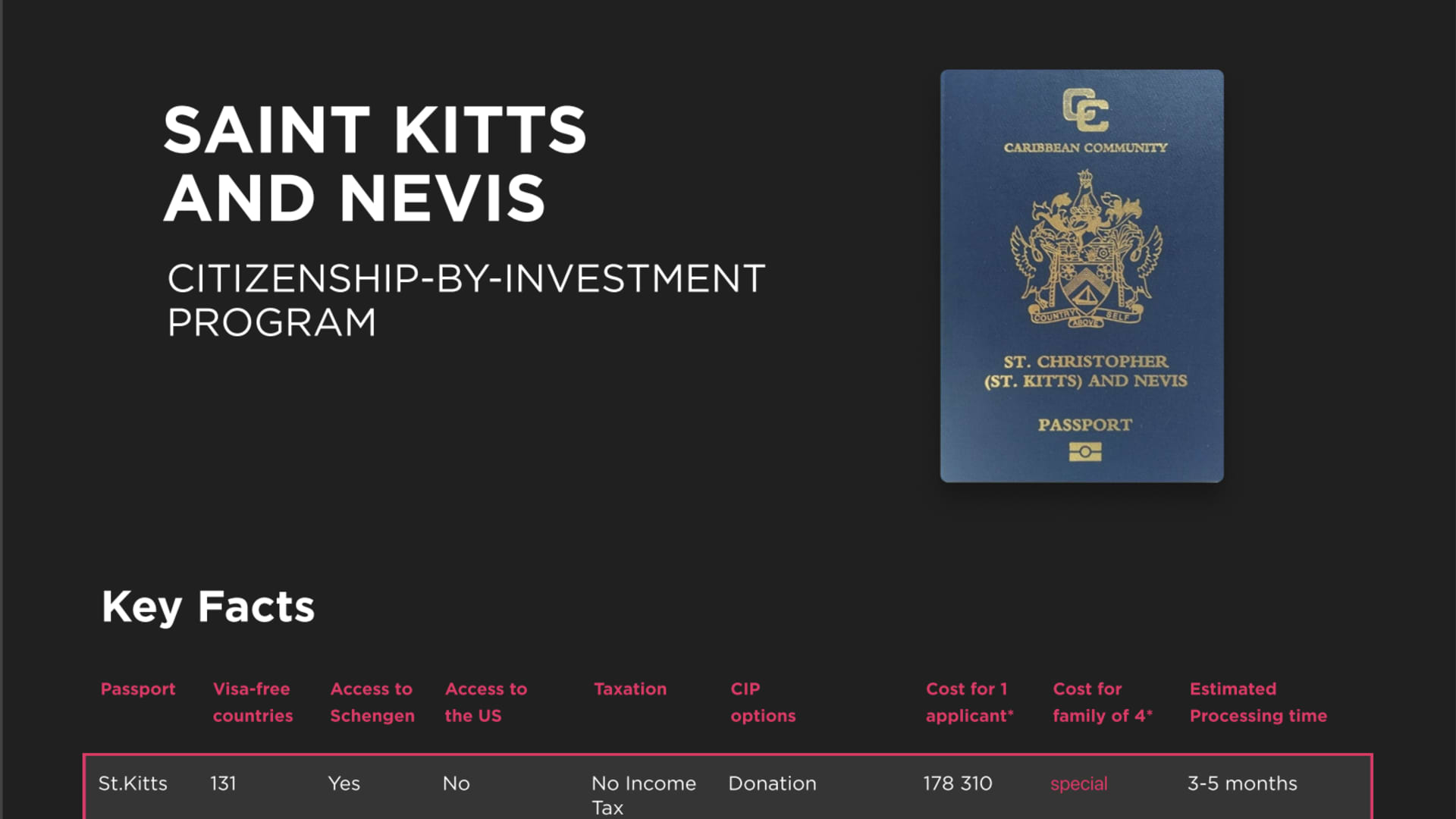
- Plan B Passport offers crypto-rich clients a path to a second passport in their pick of seven, mostly tropical, tax-haven states, all of which are exempt from capital gains taxes on crypto holdings.
- The company works in tandem with each government's residence- or citizenship-by-investment programs.
- "It's an attractive way to draw foreign investment and especially prominent in countries with few natural resources," said Ernest Marais, an attorney with international tax law firm Andersen.
Russian expatriate Katie Ananina has spent the last three years helping people dodge taxes on their bitcoin gains. It is all part of her mission to stick it to the man, one case of tax avoidance at a time.
As the name suggests, Plan B Passport offers crypto-rich clients a path to a second passport in their pick of seven, mostly tropical, tax-haven states, all of which are exempt from capital gains taxes on crypto holdings.
Get San Diego local news, weather forecasts, sports and lifestyle stories to your inbox. Sign up for NBC San Diego newsletters.
"I was smart enough to figure out that $200 in bitcoin will be worth $100,000 at some point," said Ananina. "I don't think the government should have 40% of that."
Origin story
Ananina isn't your stereotypical bitcoin maximalist, a phrase used to describe people who believe that bitcoin, and not necessarily other cryptocurrencies, is the future of finance.
Money Report
Born and raised in Chelyabinsk, a city in central Russia, 90 miles north of the Kazakhstan border, the former professional sailboat racer moved to the States in 2016 after landing a green card, thanks to her status as one of the world's top sailors.
Five and a half years ago she spoke no English, but you'd never know it to meet her.
For Ananina, the appeal of bitcoin was laid bare when she saw the Russian currency drop 50% during the two months she was living in Spain while competing for the Russian national sailing team in early 2015.
"My macroeconomics professor wasn't able to explain that to me. There was no chance I could run my equations and figure out what happened there," she said. "I realized I wasn't happy with how money works."
So began Ananina's days as a bitcoin evangelist.
But being a bitcoin maxi isn't just about believing in one currency, according to Ananina. She believes whole-heartedly in jurisdictional arbitrage, which, to her, means ditching any one government's rules over her actions and finances, and going to the place that suits her best at the moment.
"If the government starts affecting me, I will take all [my assets] into my hands and go elsewhere," she said.
This is the mindset that led the 26-year-old entrepreneur to start her own company designed to help others do just that. Ananina says that several bitcoiners she knows who have held the cryptocurrency for over one boom-and-bust cycle are thinking about getting a second passport as a way to avoid paying capital gains taxes on their holdings.
How it works
Every year, Plan B Passport helps hundreds of people from countries like the U.S., the UK, Australia, and Canada obtain a second passport in one of seven countries: Saint Kitts and Nevis, Antigua and Barbuda, Dominica, Vanuatu, Grenada, Saint Lucia, and Portugal. The company works in tandem with each government's residence- or citizenship-by-investment programs.
"It's an attractive way to draw foreign investment and especially prominent in countries with few natural resources," said Ernest Marais, an attorney with international tax law firm Andersen.
Marais, who has significant experience advising clients on cross-border tax structuring, told CNBC that that this kind of passport purchasing scheme is commonly found in tax havens -- or what are sometimes referred to as "International Finance Centers."
"In Saint Lucia you can obtain citizenship by an investment of between $100K (donation), $250K (government bonds) or $300K (real estate)," continued Marais via email.
Ananina says the average check for her customers ranges from $130,000 to $180,000.

"It's basically a donation into the sustainable growth fund of the country," she said. "So, clients make a $100,000 or $150,000 donation, plus some due diligence fees, government fees, and then $20,000 for my legal fees."
Typically, families opt for Saint Kitts, while Saint Lucia is the most popular program for single applicants, because it's one of the cheaper destinations and has a decently quick application turnaround time.
Business has never been better, according to Ananina.
"My only marketing channel is Twitter," she said. "I literally do not spend a single penny, but I'm booked out three weeks ahead on consultation calls."
Giving up U.S. citizenship
In the United States, the IRS treats virtual currency, which includes bitcoin, as well as other cryptocurrencies, as property. This means bitcoin is taxed in a manner similar to stocks or real property.
"At a basic level, the taxpayer's basis in the bitcoin is what the taxpayer purchased it for, and when the taxpayer sells or exchanges that bitcoin, it is a taxable transaction," explained Jon Feldhammer, a partner at law firm Baker Botts and a former IRS senior litigator.
"The taxpayer's income or loss is determined by taking the sales price and subtracting the taxpayer's basis," he said.
So let's say the taxpayer purchases one bitcoin for $10,000 and sells it for $50,000. This individual would face $40,000 of taxable capital gains. A second passport doesn't automatically solve their tax problems.
"If a taxpayer has a green card, is a U.S. citizen, or is a U.S. resident alien, the taxpayer owes U.S. tax on any crypto gains they have no matter where the crypto or the taxpayer is located," explained Feldhammer. "It also doesn't matter if they are dual citizens; if they are U.S. citizens, they owe U.S. tax on their worldwide income."
This is why Ananina says that many of her American clients either plan to renounce their U.S. citizenship or are considering this option for later in life.

One Plan B Passport customer, who spoke to CNBC on the condition of anonymity, said he has spent the last decade traversing southeast and central Asia, and he is seriously considering ditching his U.S. passport once he's officially a citizen of Saint Kitts. He said the $180,000 cost was totally worth it, as it represents only 1% of his net worth, and the capital gains taxes on his crypto holdings would amount to millions.
This person opted for the "premier" Caribbean passport, as he describes it, since it is the oldest and most reputable of the programs and offers the most visa-free travel.
But he warns those who are interested in applying to brace themselves for a months-long process with a lot of paperwork, including police checks and medical checks.
Would be emigrants should also note that the U.S. charges citizens a fee to cut loose.
"When a U.S. taxpayer expatriates, they are generally subject to the 'exit tax,' which is essentially a tax equal to what the taxpayer would be subject to if they sold all of their property the day before they gave up their citizenship," according to Feldhammer.
Technically legal
Unlike tax evasion, which is when an individual deliberately hides their income, tax avoidance is perfectly legal, even if large swaths of the population deem it unfair.
But Marais points out that the IRS and tax authorities are ramping up their efforts to trace digital currency holdings via some of the centralized crypto exchanges. "The IRS' reach is global, especially with the Foreign Account Tax Compliance Act," he said.
Feldhammer was with the IRS Counsel when it made significant inroads in taxing U.S. taxpayers who intentionally hid assets offshore in order to avoid U.S. taxes.
"Through a combination of informants, changes in the laws, and significant international pressure, it is now extremely hard for a U.S. person to hide assets overseas," said Feldhammer. "The U.S. can do the same thing for crypto and is already contemplating changing its laws to do just this."
The U.S. Department of the Treasury has proposed comprehensive reporting for crypto, which would make it as difficult to spend crypto, as it is cash, without it getting reported.

The IRS is also stepping up efforts at home to track down noncompliant U.S. taxpayers using John Doe summonses, a tool that allows the government to obtain information about a large group of unidentified taxpayers. In this case, the summonses were issued to different crypto exchanges as a way to find people who conducted at least $20,000 of transactions in cryptocurrency from 2016 to 2020.
Issuing these summons one exchange at a time is a clumsy way to capture noncompliant U.S. taxpayers, but it can be effective, according to Feldhammer.
This is why many exchanges steer clear of Americans altogether. Marais tells CNBC that Valr, the second-largest crypto exchange in South Africa, doesn't touch U.S. citizens.
Though Ananina isn't breaking the law, she does endure the wrath of law enforcement.
"Every time I cross the border, I get detained in the airport for three hours," Ananina claims. "They ask me a bunch of questions, and every piece of luggage goes through the craziest screening. They literally turn my socks inside out."
But she says border patrol agents can't get her down.
"If I cross border by foot, it's much easier, so I literally started flying to Tijuana and walking across the border to San Diego," she said. "It's a much faster route."






